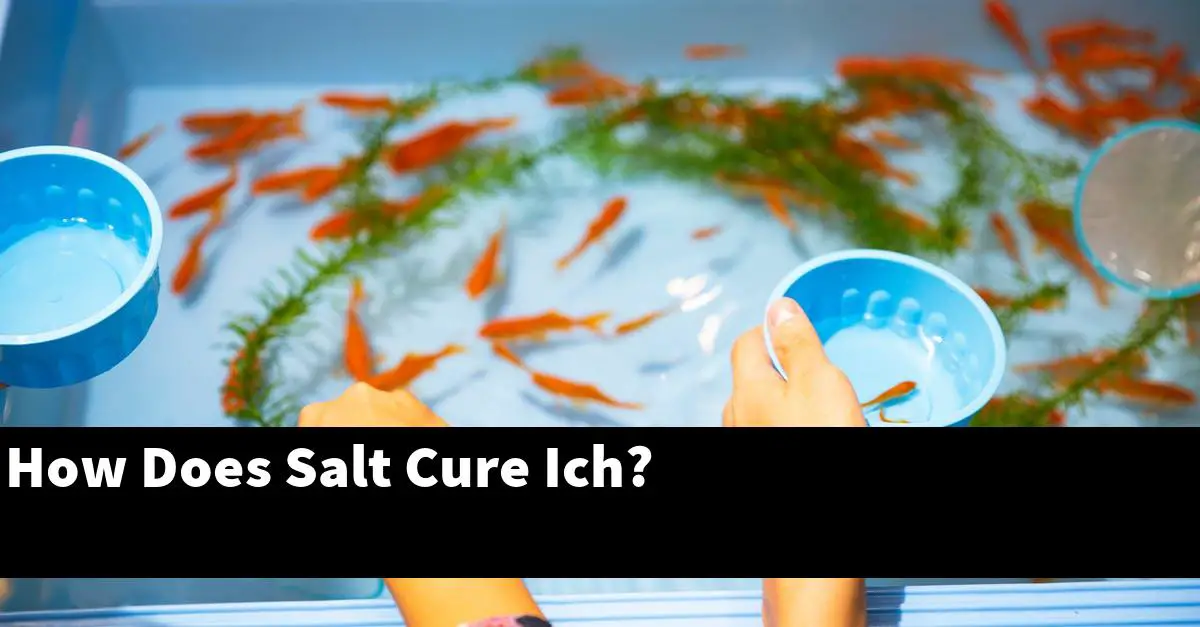Ich, also known as white spot disease, is a common ailment in freshwater aquarium fish. It is caused by a parasitic protozoan that burrows into the fish’s skin, causing irritation and white spots to form.
Salt is commonly used to treat ich, as it can help to kill the parasites and soothe the fish’s skin.
How often should I add salt to treat ICH?
The decision to add salt to an individual’s diet in order to treat ICH rests on a number of factors, including the severity of the ICH and the individual’s overall health. Generally, medical professionals recommend adding salt to an individual’s diet every day in order to increase their chances of healing.
However, adding salt too frequently can further aggravate an ICH and lead to other health complications. It is important to consult with a medical professional in order to determine the best course of treatment for an individual suffering from ICH.
Does salt help with ick?
There is some evidence that salt may help to reduce the incidence of infection by some types of bacteria, but there is no evidence that salt helps to reduce the incidence of infection by the parasite that causes ick.
How quickly does ich kill fish?
It can vary depending on the species of fish, the dose of ich, and the environment in which it is being used. Generally speaking, ich can kill fish within a few hours if it is ingested in high doses, and can take up to several days in lower doses.
How fast does salt kill ich?
Salt kills ich by disrupting the cell membrane of the ich organism. Salt also dehydrates ich and inhibits its growth.
How much aquarium salt per litre?
Aquarium salt is a mineral that is used to adjust the salinity of aquarium water. It is important to adjust the water’s salinity to ensure good water chemistry and a healthy fish population.
Aquarium salt is also used to clean aquarium glass. The amount of aquarium salt needed will vary depending on the size of the aquarium, the type of fish, and the ambient water temperature.
How often to add salt to freshwater aquarium?
When salt is added to fresh water aquariums, it is typically added at a rate of one teaspoon per ten gallons of water. This rate can be adjusted based on the specific needs of the aquarium.
Salt additions should be done monthly, and more frequent salt additions may be necessary in heavily salt-loaded water conditions.
How to treat ich naturally?
The best way to treat ich varies depending on the individual’s symptoms and overall health. However, some general tips that may help include: drinking plenty of fluids, eating a balanced and healthy diet, avoiding caffeine and alcohol, and taking over-the-counter medications as prescribed by a healthcare professional.
If symptoms persist, a doctor may prescribe anticholinergic medications or a treatment regime specific to ich.
How do you get rid of ICH fast?
ICH is a acronym for interstitial cystitis. ICH is a chronic pain condition caused by inflammation of the bladder.
The inflammation can be caused by a variety of things, including infection, pelvic floor muscles that are too tight, and the pressure of the bladder on the bladder nerve.
There is no one cure for ICH, but there are treatments that can help manage the condition. Treatment options include medications, surgery, and physical therapy.
Some people find relief from their symptoms by taking medications such as ibuprofen or naproxen. Other people may need surgery to remove the bladder inflammation.
Physical therapy can help people learn how to relax their pelvic floor muscles and reduce the pressure on their bladder.
How does salt get rid of ICH?
The chemical reaction that takes place between salt and water is what helps to get rid of ICH. The salt draws the water out of the cells, which then causes the cell to burst.
Conclusion
Salt is an effective treatment for Ich because it works to dehydrate the parasites, causing them to eventually die. This method is considered one of the most humane as it does not involve chemicals or other harsh treatments that can be harmful to fish.


